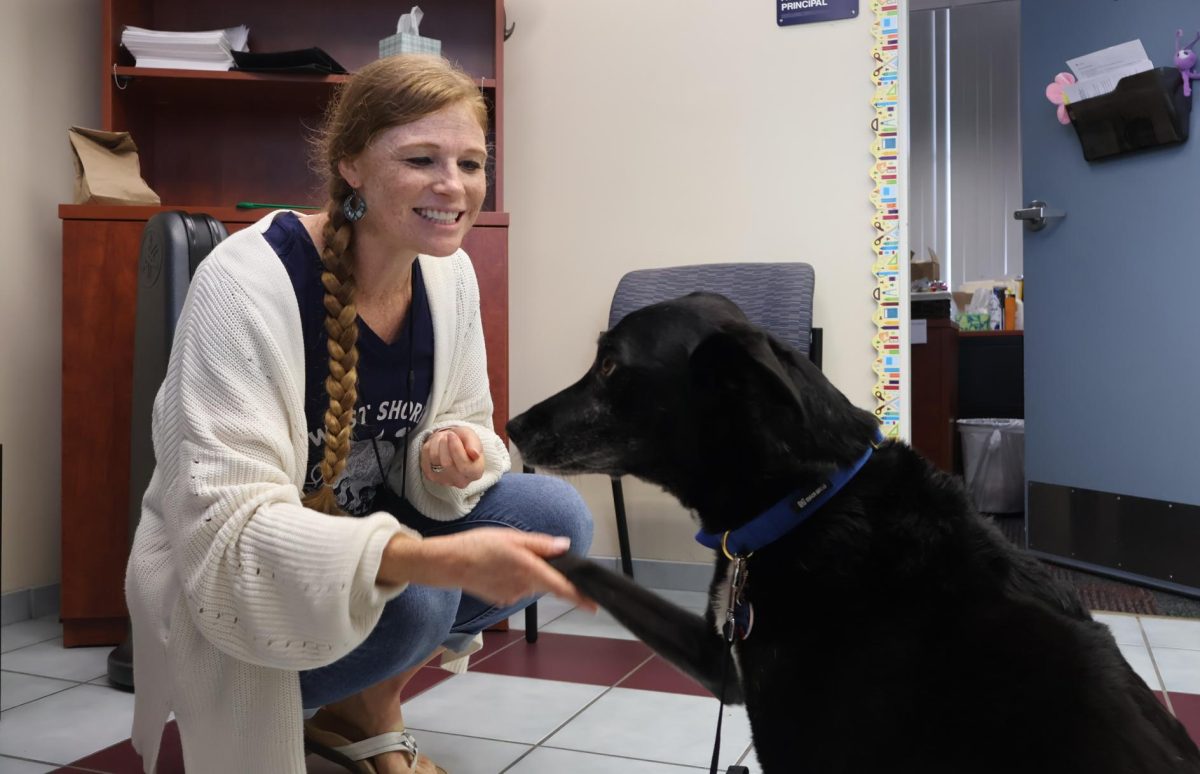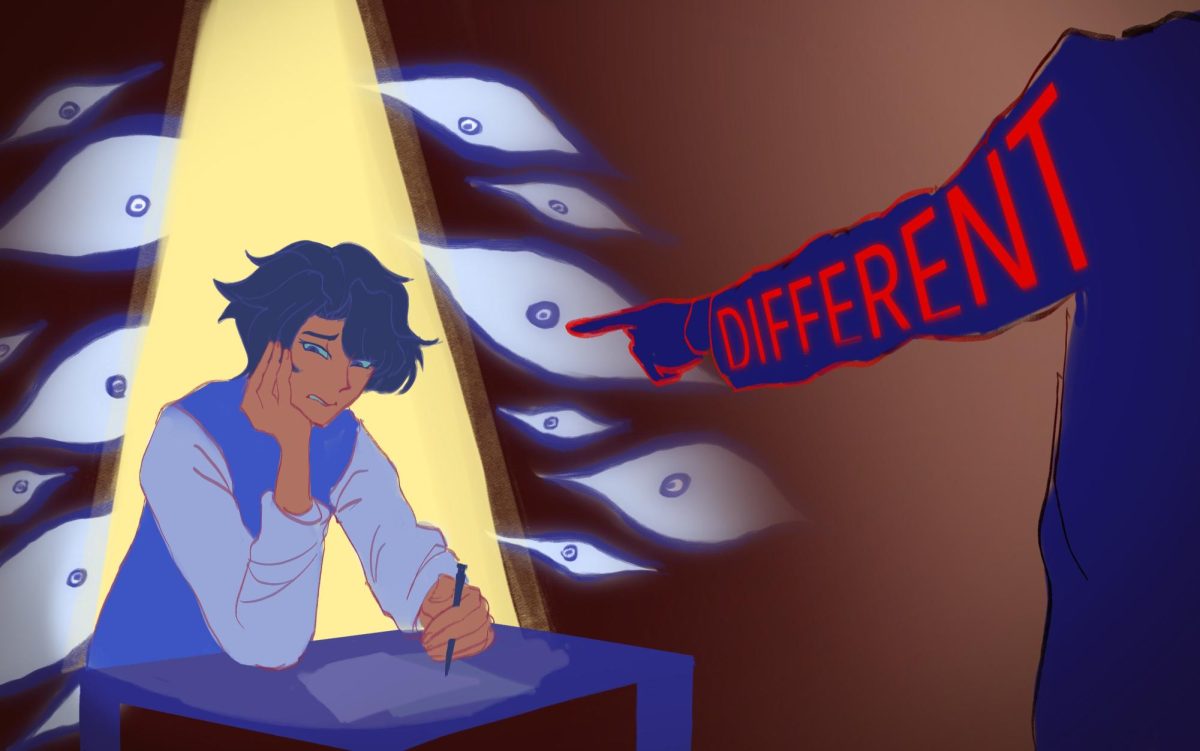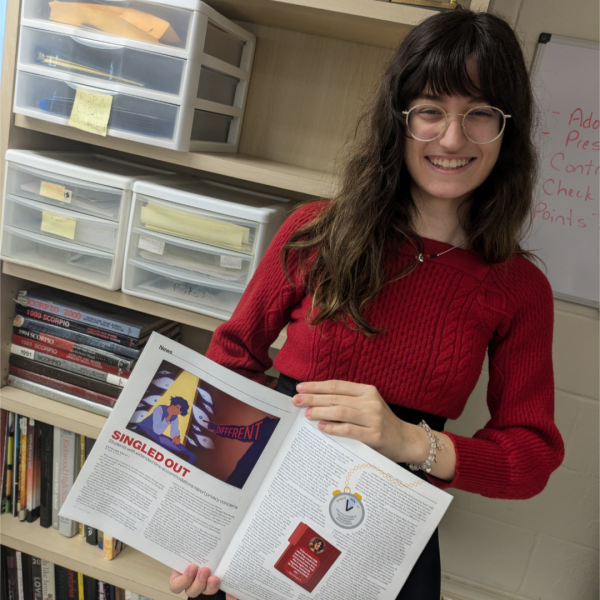When junior Siera Crum sat in one of her classes, midway through taking a test, she was caught off-guard by her teacher’s voice suddenly interrupting the quiet in the room.
“She talked to me from across the classroom and said, ‘If you need your extra time, just let me know, you can stay after class if you need to,’” Crum said. “I know it’s backed by good intentions, but at the same time, it’s outing me as a student with a learning disability.”
Like 15 percent of all public school students according to the National Center for Education Statistics, Crum has a 504 plan. These plans, along with Individualized Education Programs, are accommodations designed for students with attention-deficit/hyperactivity disorder, dyslexia, autism spectrum disorder or other circumstances that can affect their experiences in school environments.
“Being singled out like that makes me feel like an outlier [or] like I might be discriminated against for it,” Crum said. “A lot of other kids wish they could have just a little extra time, and sometimes, I feel like it might cause negative feelings to be fostered towards me.”
Extended time on assignments and tests is included as part of these accommodations, on varying levels such as 50 percent or 100 percent additional time. According to Testing Coordinator Maria Hedrick, about 10.1 percent of middle school students and 11.3 percent of high school students at West Shore have extended time accommodations.
“The 504 has mushroomed in the past several years,” Principal Rick Fleming said. “Where five years or maybe ten years ago, you may have had one or two students throughout the day that are 504, now you may have two or three per class period. Most of our teachers are veteran teachers … they might not even realize that they are drawing attention to something that is supposed to be confidential.”
But cases of accidentally being outed to other students are not unique to Crum. Other students, who wish to remain anonymous, shared similar experiences in which they felt singled out.
“There’s been quite a few instances in my time at West Shore where this has happened,” junior Sally*, who has a 504, said. “My fifth-period teacher from last year would loudly ask me in front of the whole class whenever we would take a test or quiz something like ‘you have extra time, right?’ and address me directly by name. Everyone’s heads would turn towards me and I’d feel super-embarrassed. The teacher asked me invasive questions like these a lot, and while I appreciate them asking, I just wish it was in a more private manner. I felt super-upset that the choice to disclose that information to my peers, which I would never want to in the first place, was taken away from me.”
Junior Finnegan Bennett, a student without a 504 or IEP, said that some of his teachers point at students with accommodations and address them from across the room, adding that “it happens every quiz and test and is pretty noticeable” to those without accommodations.
“After timed [tests], the teacher looks directly at me and says, ‘You have extra time so you can stay,’” Roe*, another student with a 504, said. “I get embarrassed, not by the fact that I have a 504 plan because it has helped me so much, but more by the fact that I don’t like everyone knowing because people make comments.”
Many of these students said they were unaware that instances like these are in violation of the Family Educational Rights and Privacy Act, which is a 1974 federal law that protects students’ rights to privacy. Those who were aware of FERPA expressed concern that their teachers were not informed enough on the matter.
“We do a training with the teachers and we explain to them the importance of adhering to the 504,” Fleming said. “We do educate them on FERPA violations, not just with the 504, but with medical issues as well and with students who have an IEP. [It is] not an excuse, but a reality is that teachers are so busy. Sometimes I would venture to say that across the country you have FERPA violations that occur every single day. We just need to make sure we put this front and center for the teachers that this is a critical issue for them and the student in terms of confidentiality.”
In addition to directly addressing students with extended time, a commonly mentioned issue was that even if not verbally mentioned, there were other factors that explicitly identified students with accommodations. For instance, in a class where everyone else was handwriting an assessment, Sally said her typing accommodations made it “painfully obvious” to her peers that something was different about her because she was the only one with a computer out.
“What makes it worse is that this teacher would also, on multiple occasions, refer to me and another student with this accommodation as her ‘typers’ as a joke for the whole class,” she said. “I get that they were just trying to be funny, but it was really uncalled-for. They would also ask me questions related to my accommodations from across the room.”
Jane*, another student with a 504, mentioned that one of her teachers would give students with extended time a red folder that they had to use to turn their tests in. She said that it made her feel “less than others,” as if all those around her were “normal people” and people with accommodations were “specific freaks [who] get folders because they’re special.”
“It would be different if it was a willful, wanting attempt to out a student for the sole purpose of outing them, that ‘you’re a 504 kid you don’t matter’ or something like that,” Fleming said. “I think our teachers try their best to accommodate the 504, not realizing that some of the practices that they are doing, like the red folder or calling [the student] across the room, things that have to stop. There are going to be times where students out themselves and we can’t really do anything about that, but we can better train our teachers on confidentiality.”
Jane said she thinks these issues are often not reported due to a lack of communication with school counselors. Kimberly Strauch was contacted for an interview but declined, saying that this is “the first [she is] hearing of such an occurrence, … [and] any student who has been affected can come speak to [her],” as well as that she prefers to address matters directly with the students and teachers involved.
“I don’t think any of these teachers have bad intentions, so it almost feels wrong to report it because you know they don’t mean any harm,” Sally said. “Other students might just go along with this teacher behavior because they don’t know that it’s wrong of them. I felt like that last year, but even now, knowing that teachers should be more private about these things, I feel like it’s too small of an issue to make reporting it worth it. I feel like it might not even be taken seriously, [and] there’s nothing really that can be done anymore because at this point I’ve already been outed to everyone as ‘different,’ so there’s nothing that would change.”
Crum agreed, saying that many students likely don’t know about the legality of the situation or “might brush it off as not wanting to stir up any issues with anyone.” She said that she thinks it’s a possibility that students are afraid to report these instances because “[teachers are] an authority figure” to them, and that the root of the issue is found in a lack of “understanding the nature of accommodations and how it affects the students themselves” and other students around them.
“The worst experience I’ve had with a teacher is them thinking they could deny my 504,” eighth-grader Chloe Joy Reynolds said. “[The teacher] had a problem with my 504 because part of it says that I don’t have to do presentations in front of the class, and instead I get to do it privately with the teacher. I had to get my guidance counselor involved so that [the teacher] had no choice but to allow me to do it. They didn’t seem to understand that they didn’t really have a choice.”
Fleming said that as a parent of a former student with an IEP, he wants all students with accommodations to know that “because you process information differently does not mean you are inferior,” and that he believes “quite the contrary, they are gifted in a lot of ways.” He also added that awareness on confidentiality will allow for more communication on the subject and that he hopes to hear more from students on possible solutions to these privacy issues.
“I think that the teachers definitely need to be better educated in how to handle 504 accommodations,” Reynolds said. “Especially if they aren’t your average extended time on tests or assignments like my own. As someone who has all different accommodations, I understand that just presenting to a teacher instead of to the class might be something new to some teachers, but they need to be prepared for things like this. I feel like if they got better training this probably wouldn’t happen.”
Despite the difficulties in finding balance in what does and doesn’t count as a FERPA violation, the general consensus of students with accommodations is clear: training for teachers on the nature of 504 and IEP plans must be improved.
“Educating teachers more and making them more aware of how students may feel when public attention is brought to their differences could be helpful,” Sally said. “Questions about someone’s accommodations should be made private and the teacher shouldn’t just assume that the student is OK with it being discussed in front of the whole class. If the students’ accommodations are revealed in a different way where confidentiality is out of the teacher’s control like when students need a computer for typing accommodations, the best thing a teacher can do is to just not acknowledge that difference to the best of their ability. The student should be treated with the same respect as everyone else.”
*Names of students in this story with unspecified surnames are fictitious and have been altered to protect the identity of students who chose to remain anonymous. All teachers have also been kept anonymous.


![Sophomore Isabelle Gaudry walks through the metal detector, monitored by School Resource Officer Valerie Butler, on Aug. 13. “I think [the students have] been adjusting really well," Butler said. "We've had no issues, no snafus. Everything's been running smoothly, and we've been getting kids to class on time.”](https://westshoreroar.com/wp-content/uploads/2025/08/IMG_9979-1200x800.jpg)






































